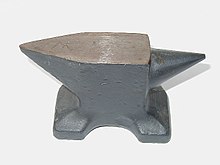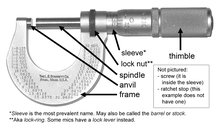anvil
English[edit]


Etymology[edit]
From Middle English anfilt, anvelt, anfelt, from late Old English anfilt, anfilte, anfealt, from earlier onfilti (“anvil”), from Proto-West Germanic *anafalt (compare Middle Dutch anvilte, Low German Anfilts, Anefilt, Old High German anafalz), compound of *ana (“on”) + *falt (“beaten”) (compare German falzen (“to groove, fold, welt”), Swedish dialectal filta (“to beat”)), from Proto-Indo-European *pelh₂-t- (“shaken, beaten”) (compare Middle Irish lethar (“leather”), Latin pellō (“to beat, strike”), Ancient Greek πάλλω (pállō, “to toss, brandish”)), enlargement of Proto-Indo-European *pelh₂- (“to stir, move”). More at felon.
Pronunciation[edit]
Noun[edit]
anvil (plural anvils)
- A heavy iron block used in the blacksmithing trade as a surface upon which metal can be struck and shaped.
- 1594 (first publication), Christopher Marlow[e], The Trovblesome Raigne and Lamentable Death of Edvvard the Second, King of England: […], London: […] [Eliot’s Court Press] for Henry Bell, […], published 1622, →OCLC, [Act I]:
- My heart is as an anvil unto sorrow,
Which beats upon it like the Cyclops’ hammers […]
- c. 1596 (date written), William Shakespeare, “The Life and Death of King Iohn”, in Mr. William Shakespeares Comedies, Histories, & Tragedies […] (First Folio), London: […] Isaac Iaggard, and Ed[ward] Blount, published 1623, →OCLC, [Act IV, scene ii]:
- I saw a smith stand with his hammer, thus,
The whilst his iron did on the anvil cool,
With open mouth swallowing a tailor’s news […]
- 1794, William Blake, “The Tyger,” lines 15-16,
- What the anvil? what dread grasp / Dare its deadly terrors clasp?
- 1839, Henry Wadsworth Longfellow, “[Miscellaneous.] The Village Blacksmith.”, in Ballads and Other Poems, 2nd edition, Cambridge, Mass.: […] John Owen, published 1842, →OCLC, stanza 8, page 102:
- Thus at the flaming forge of life / Our fortunes must be wrought; / Thus on its sounding anvil shaped / Each burning deed and thought!
- 1875–1876, Gerard Manley Hopkins, “The Wreck of the Deutschland”, in Robert Bridges, editor, Poems of Gerard Manley Hopkins: Now First Published […], London: Humphrey Milford, published 1918, →OCLC, part 1, stanza 10, page 14:
- With an anvil-ding / And with fire in him forge thy will / Or rather, rather then, stealing as Spring / Through him, melt him but master him still: [...]
- (anatomy) The incus bone in the middle ear.
- A stone or other hard surface used by a bird for breaking the shells of snails.
- The non-moving surface of a micrometer against which the item to be measured is placed.
- (meteorology) A horizontal-topped mass of cloud, shaped like a blacksmith's anvil, that forms before a thunderstorm.
Synonyms[edit]
Derived terms[edit]
Translations[edit]
|
|
Verb[edit]
anvil (third-person singular simple present anvils, present participle anvilling or anviling, simple past and past participle anvilled or anviled)
- (transitive, often figurative) To fashion on, or as if on, an anvil.
- 1648, Abraham Cowley, The Foure Ages of England, or, The Iron Age with Other Select Poems[1], London, Postscript:
- I Have anvil’d out this Iron Age,
Which I commit, not to your patronage,
But skill and Art […]
- 1671, “A Third Embassy to the Emperor of China and East-Tartary”, in John Ogilby, transl., Atlas Chinensis[2], London, page 291:
- The Family Tang caus’d an Iron Pillar to be erected there of three Rods high, and of a proportionable thickness, Anvil’d out of an intire Piece.
- 1748, [Samuel Richardson], “Letter XCII”, in Clarissa. Or, The History of a Young Lady: […], volume VII, London: […] S[amuel] Richardson; […], →OCLC, page 341:
- I never started a roguery, that did not come out of thy forge in a manner ready anvilled and hammered for execution […]
See also[edit]
Further reading[edit]
Anagrams[edit]
- English terms inherited from Middle English
- English terms derived from Middle English
- English terms inherited from Old English
- English terms derived from Old English
- English terms inherited from Proto-West Germanic
- English terms derived from Proto-West Germanic
- English terms derived from Proto-Indo-European
- English 2-syllable words
- English terms with IPA pronunciation
- English terms with audio links
- English lemmas
- English nouns
- English countable nouns
- English terms with quotations
- en:Skeleton
- en:Meteorology
- English verbs
- English transitive verbs
- en:Tools
- en:Metallurgy
- en:Clouds